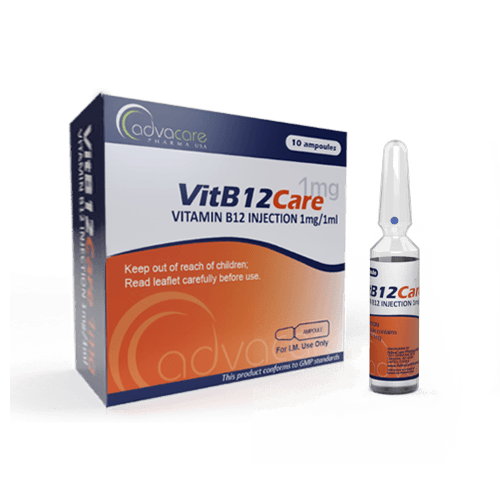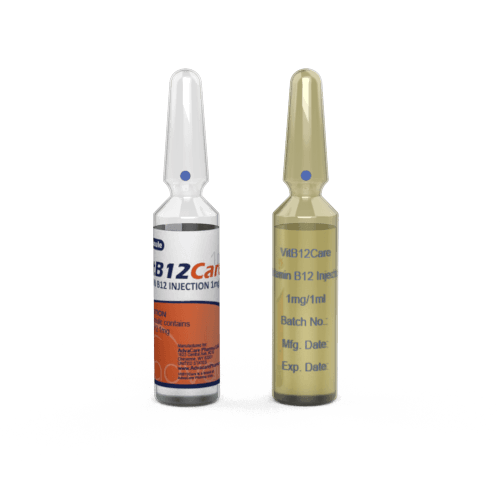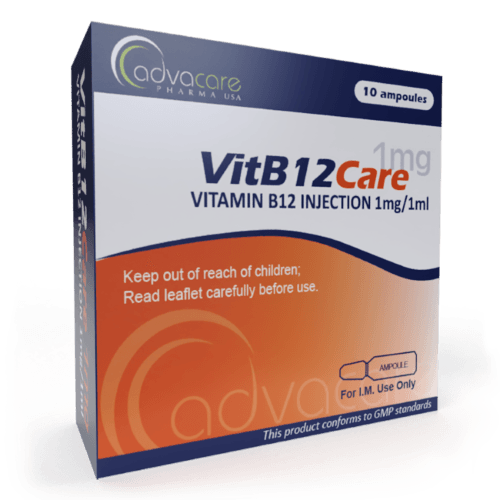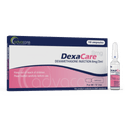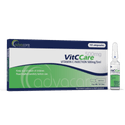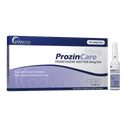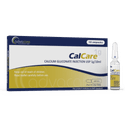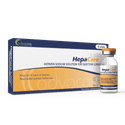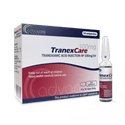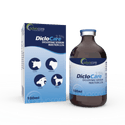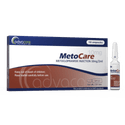- Home›
- Pharmaceuticals›
- Injections›
- Small Volume Injections›
- Vitamin B12 Injection
Vitamin B12 Injection
Dosage
Packaging
What is Vitamin B12?
Active Ingredients: Vitamin B12
Vitamin B12 Injection is used to treat and prevent vitamin B12 deficiency in patients with pernicious anemia and other conditions that cause a deficiency of this vitamin. This medication is also used for the Schilling test, which examines the efficiency that a patient's body absorbs the vitamin.
Injections of B12 may be given to patients who are unable to absorb this vitamin in their bodies due to problems such as gastrointestinal pathology or dysfunction.
Vitamin B12 may also be called cyanocobalamin or cobalamin. This water-soluble vitamin is an essential component for many physiologic systems within the body, including metabolism and DNA synthesis.
Vitamin B12 Injections are available in multiple concentrations: 0.5mg/ml, 1mg/ml, 0.5mg/2ml, and 1mg/2ml. They are packaged in ampoules, which are available in a box of 10 or 100.
Daily supplementation with Vitamin B12 Tablets is also an effective treatment for low vitamin B12 levels and may be more suitable for certain individuals.
AdvaCare Pharma produces a wide range of vitamin B injections, including Vitamin B1 Injection (Thiamine HCl), Vitamin B6 Injection (Pyridoxine HCl), and Vitamin B Complex Injection.
This medication is produced and exported by AdvaCare Pharma. These Vitamin B12 Injections are manufactured in our facilities in China, India, and the USA. Our production factories comply with WHO guidelines and standards.
Why are we a leading Vitamin B12 manufacturer?
AdvaCare Pharma, a US-owned pharmaceutical company, is a manufacturer of Vitamin B12 Injection with GMP-compliant manufacturing facilities located worldwide. We conduct frequent GMP, third-party and internal facility inspections to ensure that our manufactured injectable treatments exceed the stringent requirements of importing countries and our distributors.
As a renown Vitamin B12 manufacturer and global supplier of 120+ pharmaceutical injection products, our global reach extends to over 65 markets ensuring that pharmaceutical distributors, hospitals, pharmacies, NGOs and government institutions receive the quality-assured treatments they need.
Uses
What is Vitamin B12 used for?
It is used in the treatment and prevention of vitamin B12 deficiency in patients with conditions such as:
- Addisonian (pernicious) anemia
- Malabsorption
- Atrophic gastritis
- Prolonged treatment with metformin
- Small bowel bacterial overgrowth (SIBO)
- Total or partial gastrectomy
- Infection with the fish parasite Diphyllobothrium latum
- Helicobacter pylori infection
- Pancreatic dysfunction
- Pancreatic or bowel malignancy
- Dietary deficiency (e.g. poor nutrition or vegan diet)
- Transcobalamin II deficiency
It is also used as part of the vitamin B12 absorption test (Schilling test). Though not frequently used, the Schilling Test is performed to check how well a patient absorbs B12 within the intestinal tract. Intramuscular injections of B12 are administered during the first stage of the test, an hour after the patient takes an oral dose of radiolabeled vitamin B12.
How are Vitamin B12 Injections used?
This product has been manufactured as a solution that is intended to be injected into a muscle or under the skin. It is typically administered by a healthcare professional in a clinic or hospital, but in some situations, patients may need to administer this medication in the home environment.
Before use, the solution in the ampoule should be carefully examined for any signs of discoloration or cloudiness, and questionable solutions should be discarded. Do not use this medicine past its expiry date.
Vitamin B12 Injections may be incompatible with some types of drugs, such as warfarin and certain phenothiazines. It is compatible with vitamin B and vitamin C.
What dose should be given?
Adult Dosing Dosage may vary based on different medical indications:
- For the initial treatment of vitamin B12 deficiency, the usual dose is 1000mcg SC/IM, given once a day for 1 week, followed by 1 dose a week for 1 month. Then maintenance treatment can begin. Alternatively, 100mcg can be administered daily for 1 week, followed by every other day for 2 weeks. Then the dose can be given every 3-4 days for 2-3 weeks or until complete remission. Afterward, the patient should begin maintenance treatment. An intradermal skin test should be performed if there is a hypersensitivity risk.
- For the maintenance treatment of vitamin B12 deficiency, the usual dose is 100mcg SC/IM, given once per month.
- For the Schilling test flushing dose, 1000mcg should be administered IM.
- For Leber’s optic atrophy or smoker’s blindness, the usual dose starts at 1000mcg, given daily for 2 weeks, followed by twice weekly. Then a 1000mcg shot may be given once a month.
Pediatric Dosing Recommended dosage for children may vary based on different medical conditions:
- For the initial treatment of pernicious anemia, the usual dose is 30-50mcg SC/IM, given every day for 2 weeks, followed by maintenance treatment. Alternatively, 1000mcg can be given daily SC/IM for 2-7 days, followed by maintenance treatment. An intradermal skin test should be performed if there is a hypersensitivity risk.
- For the maintenance treatment of pernicious anemia, the usual dose is 100mcg SC/IM, given once every month.
- For the initial treatment of vitamin B12 deficiency, the usual dose is 100mcg SC/MC, given every day for 10-15 days, followed by maintenance treatment. Alternatively, 1000mcg SC/MC can be given every day for 2-7 days, followed by maintenance treatment. An intradermal skin test should be performed if there is a hypersensitivity risk.
- For the maintenance treatment of vitamin B12 deficiency, the usual dose is 60-100mcg SC/IM, given once per month.
The exact dosage is dependent on medical condition, response to the treatment, age, and weight. Refer to a doctor or pharmacist for guidelines on dosage.
Who can use Vitamin B12?
Vitamin B12 Injections can be administered to adults and children, but caution is advised for specific groups of patients.
Pregnant Vitamin B12 is generally considered safe for use by pregnant women. The daily approved amount of vitamin B12 is not anticipated to cause major fetal harm or miscarriage. It should be noted that there are many known risks associated with vitamin B12 deficiency during pregnancy. Severe deficiency has been linked to low birth weight, pre-term birth, and megaloblastic anemia. When administering a higher dose, the benefits should be weighed against the risks.
Breastfeeding Vitamin B12 is known to be distributed in human milk. Though the recommended doses are not expected to cause adverse effects for the infant, there are no human studies available to assess the risks. The clinical need must be considered in addition to any potential adverse outcomes for the infant.
Children Injections of vitamin B12 are considered safe for use in pediatric patients over 2 years old. Avoid using solutions of vitamin B containing benzyl alcohol in neonates, as gasping syndrome may occur. Prolonged treatment in premature neonates may result in toxic levels of aluminum.
Geriatric Vitamin B12 deficiency is common among elderly patients, affecting around 20% of some communities. Deficiency of vitamin B12 has been loosely associated with dementia and impaired cognitive functioning in elderly patients. It should be noted that higher dosages of vitamin B12 may be necessary when treating this population.
How should Vitamin B12 Injections be stored?
This product should be kept in its original packaging until use. It should be stored in a dark, dry place below 25°C and kept away from any moisture or excessive heat. If storing the medication at home, do not leave it in locations such as the bathroom or car, and keep the medicine out of the reach of children.
Other warnings
Intensive therapy for megaloblastic anemia may result in hypokalemia, thrombocytosis, and life-threatening complications. It is recommended to frequently monitor blood levels of potassium and platelet counts in these individuals for early detection and appropriate management of any abnormalities..
Symptoms associated with vitamin B12 may mask signs of polycythemia vera. After the resolution of the deficiency, if patients show clinical or hematologic signs associated with polycythemia vera, it is recommended they undergo further evaluations.
This product may contain aluminum, which may accumulate to toxic levels in patients with renal dysfunction or during high-dose or long-term treatment.
Cyanocobalamin is not recommended for the treatment of Leber’s disease in some regions. Alternative therapy, such as hydroxocobalamin, is advised.
Long-term vitamin B12 deficiency of greater than 3 months may result in irreversible degenerative lesions of the spinal cord (CNS).
Serum potassium levels should be monitored during the first 48 hours of treatment in patients with pernicious anemia. It is recommended to check Hematocrit, reticulocyte count, vitamin B12, folate, and iron levels before treatment begins. It should be noted that this population has a higher incidence of stomach carcinoma.
Side Effects
As with all pharmaceuticals, some unwanted effects can occur from the use of Vitamin B12 Injection.
Common side effects include, but may not be limited to:
- pain or redness at the injection site
- mild diarrhea
- pruritus (itching)
- increased swelling
- joint pain
- dizziness
- headache
- nervousness or anxiety
Serious side effects may include:
- allergic reactions
- peripheral vascular thrombosis
- hypokalemia (low potassium levels)
- pulmonary edema (fluid build-up around or in the lungs)
- thrombocytosis
- congestive heart failure
There have been reports of anaphylactic shock and death after the parenteral administration of vitamin B12.
For a comprehensive understanding of all potential side effects, consult a medical professional.
If any symptoms persist or worsen, or you notice any other symptoms, please call your doctor.
Precautions
Do NOT use Vitamin B12 Injection if
- You are allergic to any of the ingredients.
- You are allergic to cobalt.
- You have Leber's disease (hereditary optic atrophy).
- You have megaloblastic anemia and are pregnant.
Before treatment, consult your doctor regarding any medications you are taking to address potential drug interactions.Some drugs that are known to have interactions include chloramphenicol, antibiotics, antimetabolites, hormonal contraceptives, and folic acid. This is not a complete list.
This medication may not be suitable for people with certain conditions, so it is important to consult with a doctor if you have any health conditions.
Injections of vitamin B12 may affect the results of certain medical tests.
This product may contain aluminum and benzyl alcohol.
References
Vitamin B12 deficiency in the elderly
Around 10%–15% of individuals aged 60 and older are affected by vitamin B12 deficiency. Diagnosis usually entails measuring serum levels of vitamin B12 or identifying elevated levels of methylmalonic acid and homocysteine. Precise evaluation and management are vital for older adults with low vitamin B12 levels. As per this research, the primary treatment method is supplementation with vitamin B12.
To ensure sufficient intake of vitamin B12, older individuals are recommended to obtain it from supplements or fortified foods, such as ready-to-eat breakfast cereals.
Metabolic vitamin B12 deficiency: a missed opportunity to prevent dementia and stroke
The study focuses on the importance and prevalence of metabolic vitamin B12 deficiency, along with its contributing factors. Addressing B12 deficiency not only lowers the risk of stroke but also enhances cognitive function. Metabolic B12 deficiency is prevalent, impacting 10%-40% of the population. This condition remains untreated, yet it significantly influences cognitive decline and stroke incidence among older individuals.
The findings of this study indicate that the treatment of vitamin B12 deficiency can serve as a preventive measure against dementia and strokes.

You might be interested in...
Why AdvaCare Pharma?
As an industry leader, we are aware of our responsibility to provide affordable and sustainable solutions to improve healthcare worldwide.
